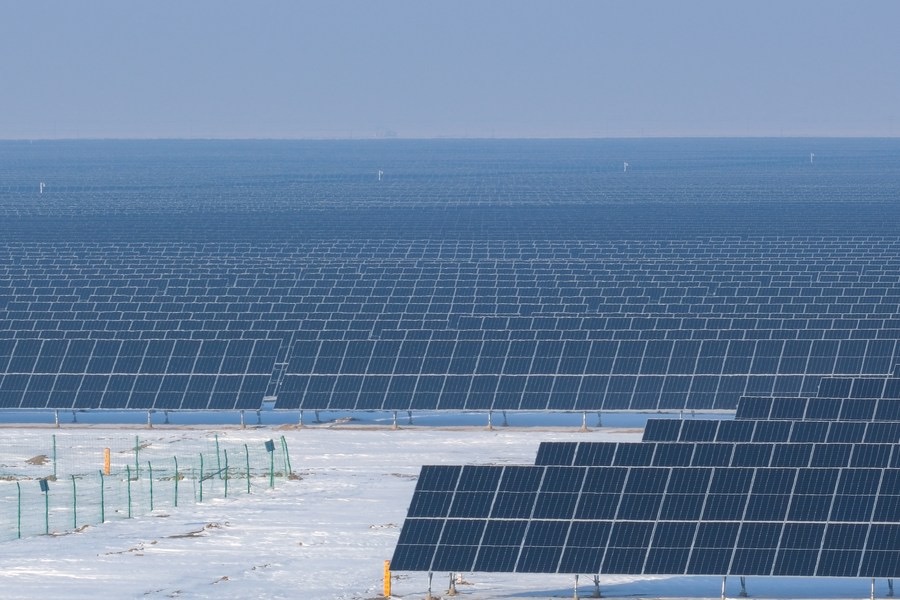Home > > Underlying hegemonic intent: U.S.'s arbitrary Xinjiang sanctions
Underlying hegemonic intent: U.S.'s arbitrary Xinjiang sanctions
Gao Tongtong

Self-driving seeders working in the farmland in Awat County of Aksu, northwest China's Xinjiang Uygur Autonomous Region, March 27, 2024. /Xinhua
Recently, the U.S. Department of Homeland Security announced the addition of 37 Chinese companies on the "Uygur Forced Labor Prevention Act (UFLPA) Entity List," marking the "largest single expansion of the list to date." Under the pretext of "forced labor," the U.S. has fabricated Xinjiang-related legislation and imposed sanctions on Chinese companies, fully exposing the ugly nature of U.S. hegemony. The malicious intent behind this is to disrupt and hinder China's stability and development.
The U.S. manipulation of the "forced labor" issue in Xinjiang is a habitual move in its anti-China playbook. Especially since the passage of the so-called Uygur Human Rights Policy Act of 2020, the U.S. presumes that the products from Xinjiang are made under "forced labor," and has intensified sanctions against Chinese companies through various methods. This systematic suppression of Chinese businesses reflects the U.S.'s hegemonic "America First" mentality.
In fact, ever since Donald Trump's first administration regarded China as a strategic competitor and launched the trade war in 2018, the U.S. has been exploiting the "Xinjiang issue" to create an anti-China atmosphere in the international community, using its domestic economic interests as a cover for political manipulation in the economic field. The latest inclusion of additional Chinese companies on the so-called entity list is just another extension of the U.S.'s ongoing policy of containing China.

A photovoltaic power project in Kazak Autonomous County of Mori, Changji Hui Autonomous Prefecture, northwest China's Xinjiang Uygur Autonomous Region, December 20, 2023. /Xinhua
Xinjiang is, in fact, a vital production hub for raw materials like polysilicon, long-staple cotton and colored cotton, essential in global industrial and supply chains. In recent years, the U.S. has been ramping up and escalating its Xinjiang-related sanctions, adding 144 Chinese companies to its list. These companies are involved in various fields, including food processing, biotechnology and international trade.
These moves not only disrupt the normal market order and cause significant damage to the legitimate interests of Chinese companies, but also breach international trade rules, severely undermining the stability of global industrial and supply chains. Furthermore, the U.S.'s reckless sanctions on Xinjiang aim at pushing the redirection of orders away from Chinese companies, thus causing widespread job losses and depriving Xinjiang's labor force of their right to work and develop – a severe violation of the human rights of local people.
The U.S. has long exploited the Xinjiang "human rights" issue to contain China, and it has gradually become ingrained in the country's "political correctness." The so-called UFLPA entity list has become a crucial "weapon" for the U.S. to target Chinese companies, escalating the risk of "economic decoupling" between China and the U.S. The indiscriminate imposition of Xinjiang-related sanctions exposes the U.S.'s attempt to politicize and weaponize human rights issues, reflecting its hypocritical stance and double standards.
In conclusion, these arbitrary sanctions are not a "magic cure" for solving any problem, nor can they prevent the people of all ethnic groups in Xinjiang from pursuing a better life.
(Gao Tongtong, a special commentator on current affairs for CGTN, is a lecturer at Jinan University School of Journalism and Communication.)
CGTN 2024-01-16
-
Top court takes steps to improve foreign case handling
Top court takes steps to improve foreign case handling
-
Xi, Putin vow to consolidate relations
Xi, Putin vow to consolidate relations
-
Beijing reiterates commitment to developing stable ties with Washington
Beijing reiterates commitment to developing stable ties with Washington
-
People-centered philosophy seen in festive visits
People-centered philosophy seen in festive visits